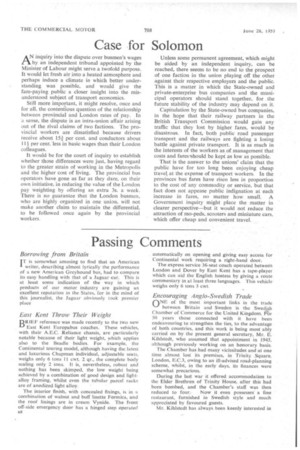Case for Solomon
Page 42

If you've noticed an error in this article please click here to report it so we can fix it.
A N inquiry into the dispute over busmen's wages EA by an independent tribunal appointed by the Minister of Labour might serve a twofold purpose. It would let fresh air into a heated atmosphere and perhaps induce a climate in which better understanding was possible, and would give the fare-paying public a closer insight into the misunderstood subject of transport economics.
Still more important, it might resolve, once and for all, the contentious question of the relationship between provincial and London rates of pay. In a sense, the dispute is an intra-union affair arising out of the rival claims of two factions. The provincial workers are dissatisfied because drivers receive about 151 per cent. and conductors about II per cent less in basic wages than their London colleagues.
It would be for the court of inquiry to establish whether those differences were just, having regard to the greater strain of working in the Metropolis and the higher cost of living. The provincial bus operators have gone as far as they dare, on their own initiative, in reducing the value of the London pay weighting by offering an extra 3s. a week. There is no guarantee that the London busmen, who are highly organized in one union, will not make another claim to maintain the differential', to be followed once again by the provincial workers. Unless some permanent agreement, which might be aided by an independent inquiry, can be reached, there seems to be no end to the prospect of one faction in the union playing off the other against their respective employers and the public. This is a matter in which the State-owned and private-enterprise bus companies and the municipal operators should stand together, for the future stability of the industry may depend on it.
Capitulation by the State-owned bus companies, in the hope that their railway partners in the British Transport Commission would gain any traffic that they lost by higher fares, would be disastrous. In fact, both public road passenger transport and the railways are fighting a losing battle against private transport. It is as much in the interests of the workers as of management that costs and fares 'should be kept as low as possible.
That is the answer to the unions' claim that the public have for too long been enjoying cheap travel; at the expense of transport workers. In the provinces bus fares have risen less in proportion to the cost of any commodity or service, but that fact does not appease public indignation at each increase in fares, no matter how small. A Government inquiry might place the matter in clearer perspective—but it would not reduce the attraction of mo-peds, scooters and miniature cars, which offer cheap and convenient travel.








































































































































